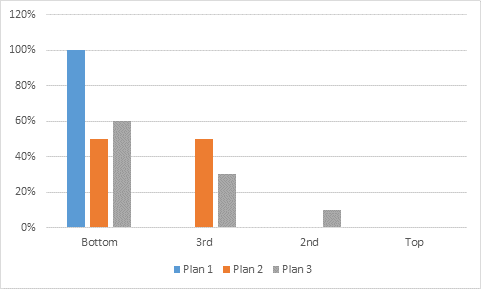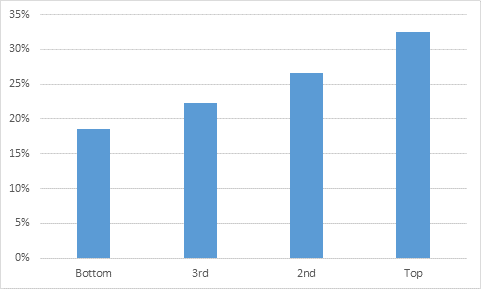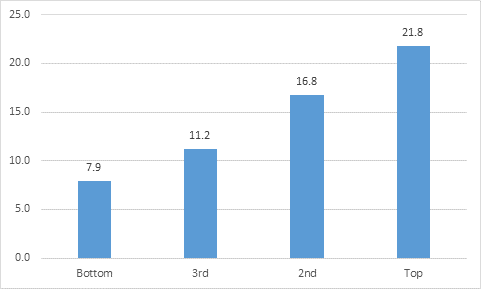Found this on a forum I frequent, pretty interesting IMO. Obviously not the title, but that's the gist of the write up.
Who’s Progressive?
To the extent that finances act as a barrier to higher education, they are an obstacle to those without resources – that is, those who tend to come from lower-income backgrounds. It is, therefore, simply common sense that if you want to relieve financial barriers, you concentrate resources among those with the fewest means.
Except, it doesn’t seem to be common sense among many of those who consider themselves “progressive” in Canada. “Progressives”, for reasons that are almost incomprehensible, prefer solutions that give far more money to students from high-SES backgrounds. Why? Good question.
The best way to focus aid is to use grants based on income (or, second best, on assessed need). By using income-targeting, you can get money to exactly who you want. Say you have $100M that you want to put towards affordability. Want to give all of it to students in the lowest income quartile? You can do that. Split it between the bottom two income quartiles? You can do that, too. Or maybe spread it out a little more thinly so that it cuts out gradually – say, 60% to bottom income quartile, 30% second quartile, 10% third quartile? You can do that, too. Grants make many different types of investments possible.
Figure 1: Some Possible Distributions of Grants Across Income Quartiles
But some people despise this idea. Some people say things like, “lower tuition is the best form of student aid”. Implicitly, because people from richer families are likelier to attend post-secondary education, the distribution of $100 million, if delivered in the form of a tuition cut, looks like this:
Figure 2: Distribution of Benefits of a Tuition Reduction, by Income Quartile
That doesn’t actually look so good compared to a grant, does it? In fact, it’s even worse than it seems. That’s because a $100 million reduction in tuition ends up affecting other types of aid as well. For every dollar of tuition reduced, students and their families lose 21-28 cents (depending on the province) in tax credits. And, to the extent that anyone has provincial need-based grants (as opposed to the mainly income-based federal ones), a dollar less in tuition means a dollar less in need, which in many cases means a dollar less in grant. Thus, for high-need students (which is not quite the same thing as low-income students, though there is some overlap), a dollar less in tuition can mean $1.25 less in non-repayable aid. That is to say, they are worse off after the tuition reduction than they were before. But the rich kids who had no need of student aid to begin with? They’re better off by $0.75.
All told then, if you spend $100 million to reduce tuition, the spread of benefits looks something like this:
Figure 3: Distribution of Benefits of a $100 Million Tuition Reduction, by Income Quartile, in Millions
Of the $100 million in reduced tuition, $42 million gets recouped by one level of government or another, either through reduced tuition tax credits or reduced grants. Of the remainder, only 13% goes to the poorest quartile, and only 38% goes to the bottom half.
So, ask yourself: who’s progressive? The folks who want to give 50, 60, or 100% of their money to kids from the bottom income quartile? Or the folks who want to give almost three times as much to the top quartile as to the bottom?
Thread: Why lower tuition is regressive
-
2017-05-22, 02:25 AM #1
Why lower tuition is regressive
Last edited by NED funded; 2017-05-22 at 02:27 AM.
-
2017-05-22, 03:32 AM #2
I'm really not sure what the article is saying? Lower tuition is regressive because grants look at how much the tuition costs as a portion of income, and since lower tuition makes those a smaller percentile, effectively raising the income portion, kids get less financial help because it looks like they'd need less money?
Wouldn't though kids also need less money for tuition anyway?
Like, lets say Kiddo wants to go to college. College costs 250 and his parents make 500, thus making college 1/2 of their income. Because of this, he is eligible for a grant of 150, bringing the cost of college to 1/5th of income. Now, lets lower tuition to 100. Tuition is now 1/5th of income, so he doesn't get a grant at all. The end cost is the same. If I'm reading this article right, the math involved in issuing grants means that if college is 250/500 which means they get a 150 grant, if we lower that to 200/500, they only get a 75 grant, effectively increasing the cost and end ratio college cost to income.
But by this logic, we would be better served by increasing the cost of college. Higher cost-to-income ratios mean higher grants...except the grants have a cap. If college costs 500/500, they don't qualify for a 400 grant, they instead get a 250 grant, more than they got before, but still resulting in a higher cost-to-income ratio.
Seems like an argument for free college to me. Tack on a scaling tax based on income and you end up with rich people paying more and poor people paying less, which is, according to the article, apparently the better solution, but none of the kids or parents have to pay as much directly out of their pockets.Human progress isn't measured by industry. It's measured by the value you place on a life.
Just, be kind.
-
2017-05-22, 04:03 AM #3
It's a silly argument, honestly, because it ignores that you can do multiple things simultaneously. And it's using "regressive" in the sense that's used for taxation, which muddies the waters a bit.
Reducing prices helps somewhat, but if the newly reduced price is still "too high" for the poorest quintiles, it won't help them afford college much. If, and only if, that's all you do. This is their argument, and it's silly, because we're going to keep offering income-based subsidies and scholarships.
The moment you also provide income-based subsidies and grants and scholarships to offset that issue, the reduced tuition costs makes those funds more effective, and able to bring more students to university than they otherwise could have. At which point it's clearly progressive (in the same manner that they're using the label). More so than in a world without the tuition reductions.
Focusing exclusively on tuition reductions and pretending that there are no other means of getting university funding is just . . . odd. It's a manipulation of the context we're discussing to try and misrepresent the facts.
-
2017-05-22, 04:14 AM #4I am Murloc!


- Join Date
- Apr 2011
- Location
- Aarhus, Denmark, Europe
- Posts
- 5,079
-
2017-05-22, 04:22 AM #5
-
2017-05-22, 04:30 AM #6
Universities should be free for the people of that state and applicants from that state should have priority over people from other state (assuming same grades/scores). Unfortunately schools make more money from out of staters/country so they give out spots which should be reserved for the taxpayers of that state. That is how it used to work for my dad's generation. College was incredibly cheap and could be paid off with a part time job while in college.
-
2017-05-22, 05:34 AM #7
The thread title seems like it's designed to confuse people who don't read the article. Income based grants are preferred to lower tuition overall that doesn't mean affordable education in general isn't progressive, it just suggest there's a smarter way of doing it.
/shrug
-
2017-05-22, 05:58 AM #8
This is such an odd claim. The gist of the argument is that due to demographics the tuition subsidy is regressive.
You answer seems to be that:
> Free tuition and grants change demographics.
This is not true as we can see on Britains experiment on the issue. The problem is one in which people don't value their education or just can't enter due to poor conditions. (Broken family, shitty early education, etc)
>Further grants solve the problem of grants
Based Smrund made a good point here, but yours isn't holding. If there is no change of demographics then it just seems like wasteful spending to keep up with the subsidies, instead of just using targeted benefits.Last edited by NED funded; 2017-05-22 at 06:12 AM.
-
2017-05-22, 07:50 AM #9
That's not the argument being made at all. It's that it's "regressive", meaning that the system advantages the wealthy more than the poor it's meant to support. And that's wrong, because it's an argument that ignores that lower tuitions isn't the only thing being pursued and contributed.

-
2017-05-22, 11:21 AM #10
Yeah, that's due to demographics in universities, most people there are already well off (hence the graphs) The argument you are speaking of was barely mwntioned in the article.
Your answer is this:And that's wrong, because it's an argument that ignores that lower tuitions isn't the only thing being pursued and contributed.
Like I said this is wasteful spending unless you change demographics, which free tuition won't, so its better to solely focus on targetted benefits.The moment you also provide income-based subsidies and grants and scholarships to offset that issue
-
2017-05-22, 11:40 AM #11
Here's the TL;DR -
Using funding to lower tuition lowers it for everyone, both poor and rich alike. Using that money to give grants (and other types of aid) targeted to those who actually need it will ensure more of that money goes to the poor.
That's true if you're only going to allocate enough money to partially offset costs. If you allocate enough money to make it free for anyone (or anyone who meets basic academic standards) then this becomes a non-issue.
This is also a very one-dimensional way of thinking about it. We have a multitude of sources of funding that both reduce cost of tuition for the student, as well as grant programs that simply give you money for tuition if you're poor, tax credits if you're going to school and are below a certain income, scholarships targeted at disadvantaged demographics, etc.
This is more of an argument against solely using all funds to lower tuition, than it is an argument against any real system currently in place.Last edited by Cthulhu 2020; 2017-05-22 at 11:42 AM.
2014 Gamergate: "If you want games without hyper sexualized female characters and representation, then learn to code!"
2023: "What's with all these massively successful games with ugly (realistic) women? How could this have happened?!"
-
2017-05-22, 12:12 PM #12
-
2017-05-22, 12:16 PM #13
I don't believe in high-stakes gambling, and that is exactly what the USA College system is.
-
2017-05-22, 12:34 PM #14I am Murloc!


- Join Date
- Jan 2015
- Posts
- 5,010
The problem with the university system is that it was always fundamentally broken. Yes, college degrees were valuable once upon a time, but that had nothing to do with anything you'd learn in school, and everything to do with the fact that most people who went to college were already rich and well-connected to begin with, and could have just partied for four years and still done well for themselves after graduating. Now that everybody seemingly must go to college by default, that advantage has completely eroded. Sure, an education is still valuable from the standpoint of intellectual enrichment and personal development, but in financial terms it's almost certainly not going to pay for itself.
-
2017-05-22, 12:51 PM #15I am Murloc!


- Join Date
- Apr 2011
- Location
- Aarhus, Denmark, Europe
- Posts
- 5,079
-
2017-05-22, 12:52 PM #16
If Uni costs nothing for everyone, then everyone benefits equally from it. I can kinda see the argument that only partially subsidizing the cost still makes it harder for poor people to do it, since they still have to pay a proportionally higher portion of their income on schooling than the wealthy... but if it costs nothing for everyone because of TAX DOLLARS for which the wealthy will be paying more, then it's suddenly a progressive system.
The only conditions in which your scenario is regressive is if the money is coming from thin air and uni is only partially subsidized and still costs a lot for everyone.2014 Gamergate: "If you want games without hyper sexualized female characters and representation, then learn to code!"
2023: "What's with all these massively successful games with ugly (realistic) women? How could this have happened?!"
-
2017-05-22, 01:43 PM #17
-
2017-05-22, 03:07 PM #18
This is literally not true. If it costs nothing for everyone then those that benefit the most are the ones that have higher incomes. Under this scenario its still regresssive. Take for example labor's program for free tuition, it uses your progressive taxation.

- - - Updated - - -
And??? 12345
-
2017-05-22, 04:30 PM #19
This is incomprehensibly incorrect. A regressive system has to produce more advantage for wealthier quintiles than poorer ones. If tuition is free, then there's no advantage to any quintile, and what advantage the upper quintiles had (having income they can afford to spend on tuition) no longer exists.
That's progressive. By definition.
That graph literally doesn't say what you think it says.Under this scenario its still regresssive. Take for example labor's program for free tuition, it uses your progressive taxation.

- - - Updated - - -
And??? 12345
Here's the original source; https://election2017.ifs.org.uk/arti...d-benefit-most
That author is making the point that student loans are repaid as a percentage of income, so higher-income graduates pay back more. Removing tuition fees, as they admit, obviously causes the amounts repaid to decline. It's actually not even a fair comparison, because the tuition loans work on this percentile system, unlike regular interest-based loans, which is why the other two lines flatten out as they're paid off, and don't scale higher as your income rises further.
That's an artifact exclusively of their particular loan repayment system, not the idea of free tuition in general.
-
2017-05-23, 12:21 AM #20
It's regressive in how the benefits are redistributed, i.e most of it falls on those well off. (The article posted in the OP)
In addition, having a higher income and no tuition is substantially better (since one has more access to that extra income), than having lower income and having to pay no tuition. This would still hold true in targeted benefits (people that are closer to the top of the income bracket would benefit more), but this is better than flat out not giving the assistance.
I'm unsure why you wrote the word admit like that, it doesn't emphasize anything of importance. (/shrug)That graph literally doesn't say what you think it says.
Here's the original source; https://election2017.ifs.org.uk/arti...d-benefit-most
That author is making the point that student loans are repaid as a percentage of income, so higher-income graduates pay back more. Removing tuition fees, as they admit, obviously causes the amounts repaid to decline. It's actually not even a fair comparison, because the tuition loans work on this percentile system, unlike regular interest-based loans, which is why the other two lines flatten out as they're paid off, and don't scale higher as your income rises further.
That's an artifact exclusively of their particular loan repayment system, not the idea of free tuition in general.
Ok, since you remain unconvinced go pick an example in which free tuition is not regressive.

 Recent Blue Posts
Recent Blue Posts
 Recent Forum Posts
Recent Forum Posts
 The War Within Alpha - Warbands Feature Overview
The War Within Alpha - Warbands Feature Overview Filter options for non retail wow content
Filter options for non retail wow content Are we approaching a Solo Raid WoW Experience?
Are we approaching a Solo Raid WoW Experience? MMO-Champion
MMO-Champion





 Reply With Quote
Reply With Quote





